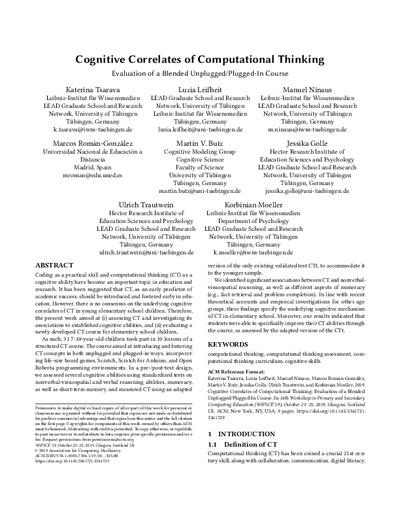 Diese Seite wurde seit 2 Jahren inhaltlich nicht mehr aktualisiert.
Unter Umständen ist sie nicht mehr aktuell.
Diese Seite wurde seit 2 Jahren inhaltlich nicht mehr aktualisiert.
Unter Umständen ist sie nicht mehr aktuell.
 Zusammenfassungen
Zusammenfassungen

Coding as a practical skill and computational thinking (CT) as a cognitive ability have become an important topic in education and research. It has been suggested that CT, as an early predictor of academic success, should be introduced and fostered early in education. However, there is no consensus on the underlying cognitive correlates of CT in young elementary school children. Therefore, the present work aimed at (i) assessing CT and investigating its associations to established cognitive abilities, and (ii) evaluating a newly developed CT course for elementary school children.
As such, 31 7-10-year-old children took part in 10 lessons of a structured CT course. The course aimed at introducing and fostering CT concepts in both unplugged and plugged-in ways, incorporating life-size board games, Scratch, Scratch for Arduino, and Open Roberta programming environments. In a pre-/post-test design, we assessed several cognitive abilities using standardized tests on nonverbal-visuospatial and verbal reasoning abilities, numeracy, as well as short-term memory, and measured CT using an adapted version of the only existing validated test CTt, to accommodate it to the younger sample.
We identified significant associations between CT and nonverbal-visuospatial reasoning, as well as different aspects of numeracy (e.g., fact retrieval and problem completion). In line with recent theoretical accounts and empirical investigations for other age groups, these findings specify the underlying cognitive mechanism of CT in elementary school. Moreover, our results indicated that students were able to specifically improve their CT abilities through the course, as assessed by the adapted version of the CTt.
 Dieses Konferenz-Paper erwähnt ...
Dieses Konferenz-Paper erwähnt ...
 Personen KB IB clear | Osman Aksit , Christopher Ariza , Jodi Asbell-Clarke , Marina Umaschi Bers , Ulf Dalvad Berthelsen , Kristy Elizabeth Boyer , Shannon Campe , Sande Chen , Damon Chizuru Kawamoto , Jacob Cohen , Samuel Collins , Stephen Crain , Quintin I. Cutts , Josh Dehlinger , Jill Denner , Charles Dierbach , Louise P. Flannery , Brendan Foreman , Susanne E. Hambrusch , Harry Hochheiser , Peter Hubwieser , Sungsoon Hwang , Gerald J. Jerome , Joshua Jones , Siddharth Kaza , Elizabeth R. Kazakoff , Tina Kelleher , William Kleinsasser , Siu Cheung Kong , John T. Korb , James C. Lester , Robert Kwok-yiu Li , Jennifer E. London , Eva Marinus , Chris Mayfield , Genevieve McArthur , David Michael , Jesús Moreno-León , Bradford W. Mott , Andreas Mühling , Jack Parkinson , Ljubomir Perkovic , Zoe Powell , Mitchel Resnick , Gregorio Robles , Alexander Ruf , Linda M. Seiter , Amber Settle , Josh Sheldon , Valerie J. Shute , Chen Sun , Rosalind Thornton , David Weintrop , Linda L. Werner , Eric N. Wiebe , Uri Wilensky , Ben Williamson , Jeannette M. Wing , Aman Yadav , Ninger Zhou | |||||||||||||||||||||||||||||||||||||||||||||||||||||||||||||||||||||||||||||||||||||||||||||||||||||||||||||||||||||||||||||||||||||||||||||||||||||||||
 Begriffe KB IB clear | AgentCubes
, computational thinkingcomputational thinking
, Dr. Scratch
,  Kinder Kinder children
, Kurzzeitgedächtnisshort-term memory
, children
, Kurzzeitgedächtnisshort-term memory
,  Programmieren Programmieren programming
, programming
,  Scratch Scratch
| |||||||||||||||||||||||||||||||||||||||||||||||||||||||||||||||||||||||||||||||||||||||||||||||||||||||||||||||||||||||||||||||||||||||||||||||||||||||||
 Bücher |
| |||||||||||||||||||||||||||||||||||||||||||||||||||||||||||||||||||||||||||||||||||||||||||||||||||||||||||||||||||||||||||||||||||||||||||||||||||||||||
 Texte |
|
 Dieses Konferenz-Paper erwähnt vermutlich nicht ...
Dieses Konferenz-Paper erwähnt vermutlich nicht ... 
 Nicht erwähnte Begriffe | AgentSheets, Eltern, Langzeitgedächtnis |
 Tagcloud
Tagcloud
 Zitationsgraph
Zitationsgraph
 Zitationsgraph (Beta-Test mit vis.js)
Zitationsgraph (Beta-Test mit vis.js)
 Zeitleiste
Zeitleiste
 3 Erwähnungen
3 Erwähnungen 
- Proceedings of the 14th Workshop in Primary and Secondary Computing Education, WiPSCE 2019, Glasgow, Scotland, UK, October 23-25, 2019 (2019)
- Development of a Questionnaire on Self-concept, Motivational Beliefs, and Attitude Towards Programming (Luzia Leifheit, Katerina Tsarava, Korbinian Moeller, Klaus Ostermann, Jessika Golle, Ulrich Trautwein, Manuel Ninaus) (2019)


- Development of a Questionnaire on Self-concept, Motivational Beliefs, and Attitude Towards Programming (Luzia Leifheit, Katerina Tsarava, Korbinian Moeller, Klaus Ostermann, Jessika Golle, Ulrich Trautwein, Manuel Ninaus) (2019)
- WIPSCE '23 - The 18th WiPSCE Conference on Primary and Secondary Computing Education Research (Sue Sentance, Mareen Grillenberger) (2023)
- Making the Transition to Text-Based Programming - The Pilot Evaluation of a Computational Thinking Intervention for Primary School Students (Katrin Kunz, Korbinian Moeller, Manuel Ninaus, Ulrich Trautwein, Katerina Tsarava) (2023)


- A Systematic Literature Review on Physical and Action Based Activities in Computing Education for Early Years and Primary (Anaclara Gerosa, Maria Kallia, Quintin I. Cutts) (2023)


- Making the Transition to Text-Based Programming - The Pilot Evaluation of a Computational Thinking Intervention for Primary School Students (Katrin Kunz, Korbinian Moeller, Manuel Ninaus, Ulrich Trautwein, Katerina Tsarava) (2023)
 Anderswo finden
Anderswo finden
 Volltext dieses Dokuments
Volltext dieses Dokuments
 |  Cognitive Correlates of Computational Thinking: Artikel als Volltext ( Cognitive Correlates of Computational Thinking: Artikel als Volltext ( : :  , 3287 kByte; , 3287 kByte;  : :  ) ) |
 Anderswo suchen
Anderswo suchen 
 Beat und dieses Konferenz-Paper
Beat und dieses Konferenz-Paper
Beat hat Dieses Konferenz-Paper während seiner Zeit am Institut für Medien und Schule (IMS) ins Biblionetz aufgenommen. Beat besitzt kein physisches, aber ein digitales Exemplar. Eine digitale Version ist auf dem Internet verfügbar (s.o.). Es gibt bisher nur wenige Objekte im Biblionetz, die dieses Werk zitieren.










 Biblionetz-History
Biblionetz-History